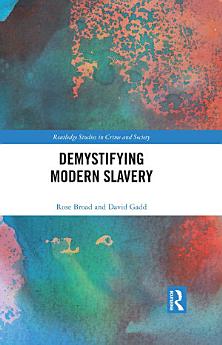Demystifying Modern Slavery
About this ebook
Through an interpretive analysis of offenders’ life stories, we reveal the points in the past and present where interventions could have prevented victims from becoming trapped in exploitation. We show that while national governments and international bodies often appear resolute in their efforts to tackle modern slavery and people trafficking, they have also obscured their own roles in compounding the plights of those at the sharp ends of globalization. In racializing the actions of sex traffickers, grooming gangs, and organized criminals, the modern slavery agenda has mystified the roles market dynamics, the absence of workers’ rights, and immigration controls play in generating vulnerabilities to exploitation.
This book will be of interest to a wide range of students, policymakers and practitioners concerned with modern slavery, human trafficking, border control and immigration, globalization and inequality, as well as the more disciplinefocused criminological audiences concerned with why people commit crimes, what should be done about them and the, often paradoxical, consequences of social control across borders. Given the book’s strong focus on narrative, psychosocial and social network methodologies, it will also appeal to audiences across the social sciences concerned with applying these novel approaches to difficult to reach populations.
About the author
Rose Broad is a Senior Lecturer at the University of Manchester.
David Gadd is a Professor of Criminology at the University of Manchester.







